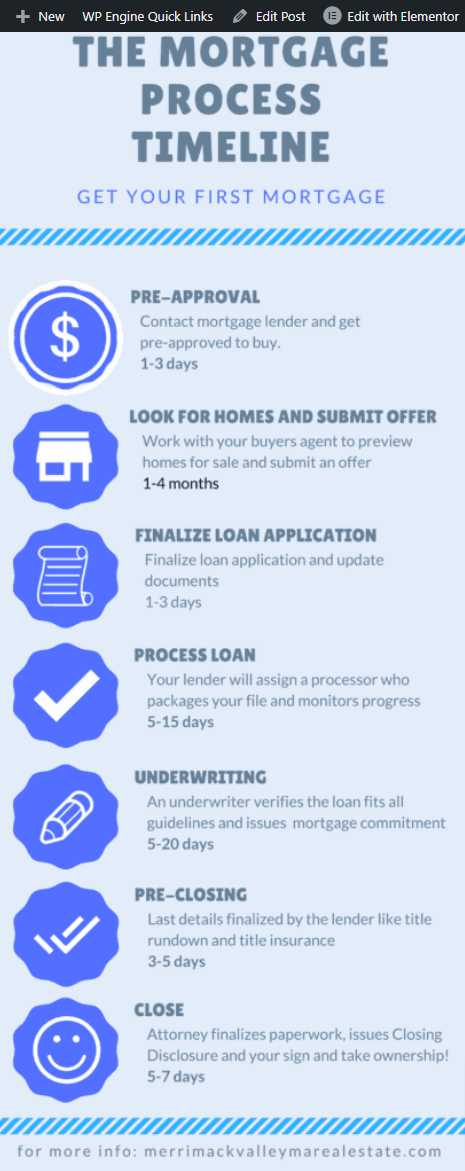Homeownership is exciting. You have decided it is the right time to buy your first home. You are going to enter the realm of being a first-time homebuyer. Now it is time to go about getting your first home mortgage.
The first thing you should do before even looking at houses is to take a look at the money involved in buying your first home. It is time to sit down with a mortgage officer and review your finances and discuss what first bank mortgage options you have.
The mortgage process is one of the more complicated and frustrating pieces when buying a home especially for a first-time home buyer in Massachusetts.
It is important to start the mortgage process early with a good mortgage officer. Starting early will make the whole buying experience much smoother.
A little understanding can go a long way in preventing frustration down the road. Start the mortgage process first, understand the money involved and be pro-active.
Getting Your First Home Mortgage- A Quick Mortgage Primer
There are three major aspects that go into your credit profile and getting approved for a mortgage. Y
our ability to secure credit on a home hinges on what is commonly called the 3 C’s. Basically, you must document to the bank your ability to handle the 3 C’s, credit, capacity and income.
Credit Worthiness
Your credit score will play a major role in your interest rate and first-time homebuyer loan programs that are available to you.
Most loan programs for first-time homebuyers will want to see a minimum credit score of 620 to 680. While there are programs that can go down to a 580 credit score the terms are definitely less favorable to you. Your credit score shows your history in handling credit to your lender.
Pulling your credit score immediately will be a big help in the process. It will give you time to correct any mistakes as well as maybe be able to raise your credit score by the time your ready to actually get a mortgage.
Capacity
Your ability to repay the mortgage is called capacity. They will look at earnings history and confirm it is stable and re-occurring. As a rough guideline, the banks want no more than 41% of your gross earnings going towards debt service.
This is called debt to income ratio. Debt service will include mortgage, interest, insurance on housing and any consumer debt. Consumer debt could include a car payment, minimum credit card payments, student loan payments would fall into the category of consumer debt.
Take a couple earning $9000 a month. They have a car loan of $400/mo, two credit cards with a minimum payment of $250/mo and student loans totaling $750/mo. A 41% debt to income ratio would allow up to $3014 a month towards principal, interest and insurance.
Collateral
Collateral is the available funds you have for the down payment and closing costs and pre-paids and escrows. Closing costs are the hard costs of obtaining the loan. Pre-paids and escrows are money that is either pre-paid like insurance and money that is used to fund escrow accounts for insurance and taxes. Usually, you have to fund an escrow account for 3-6 months in advance on insurance and taxes
At a bare minimum, the bank wants to see that you have the funds to close. Many loans may require you have reserve or “backup funds” funds leftover from 1-6months worth of payments.
Varying aspects of the 3 C’s will change your credit profile and your ability to get approved for certain programs and your interest rate.
Can I Get A First Home Mortgage With Bad Credit?
You can certainly buy a house with bad credit. Of course, bank financing will be a little more challenging and you may pay more in closing costs and interest.
If you have a credit score between 500-620 the FHA loan program might be best for first-time homebuyers with bad credit.
Explore your options for poor credit situations with your loan officer. There is no need to sit on the side lines if your credit is poor. You can still buy a house but expect there to be challenges along the way.
Your First Home Mortgage- What Does the Bank Want?
As pointed out above the bank wants to make sure you can handle repaying the loan by analyzing your creditworthiness, your ability to repay and the available cash you have and that the house is worth what they are lending on through the appraisal.
What you probably don’t know is that the bank has institutional guidelines to be met so your mortgage can be easily sold. Most loans need to meet Fannie Mae Guidelines to do so. The loans are grouped and bought and sold by financial institutions on a regular basis to fill out their portfolio needs. Lenders do not hold loans and most banks only hold a small portion of the loans they make.
If a loan doesn’t meet guidelines after it is sold and an audit is done, the lender must buy back the loan. Not good!! This hopefully explains some of the frustration the bank may make you go thru to get a home mortgage. They are checking and double checking that the loan fits the criteria and that anybody down the line can pick the file and see it is compliant.
More About Your Mortgage Credit Score And Buying Your First Home
When applying for your first bank mortgage your mortgage officer will hopefully pull a tri-merge credit report. This credit report is specifically for the mortgage industry and defined by the algorithm used in determining your credit. Your credit score can actually be quite different with a mortgage tri-merge credit report than for a car loan or other lines of credit.
It is called a tri-merge as credit is pulled from 3 credit reporting agencies, Equifax, Experian and TransUnion. Each company will give a credit score. Sometimes they are all close other times there can be a wide swing depending on how they are reporting different lines of credit.
The middle credit score is what will be used throughout the process. If there are two borrowers the lowest middle credit score will be used.
It is important to immediately check your credit report for errors…. it happens, more than you think.
A 620 credit score is typically the lowest credit score for mainstream mortgage financing. For approximately every 20 points in credit score, there will be an improvement in the mortgage rate. Ask your mortgage officer if their are small things you can do to increase your credit score. Many times there is. Sometimes paying down a credit card a few hundred bucks or paying off a car loan early can improve you credit score.
Your credit will typically be pulled every 90 days through out the process. Do not do anything to damage your credit while in the process. Keep your credit profile exactly the same, don’t open a Home Depot credit card in anticipation of you new home, don’t buy a new car or a new boat on credit, etc….
Pre-Approval
After the credit is pulled and seems satisfactory, your mortgage officer will request to see documents to verify your income (capacity) and assets (collateral).
Documents Needed For A Mortgage Pre-approval
- 2 months worth of paycheck stubs
- Profit and Loss Statement and 1099’s if you are self-employed
- 2 years W2’s and tax returns
- 2 months’ worth of asset accounts, checking savings, retirement etc…
All the information will be input into an application and then your mortgage officer can make a determination of your eligibility for first time home buyer loan programs.
Once a loan application is completed and a credit score is obtained, different scenarios can be run. What if you put 3% down vs 5% down or 10% down? At this point, a loan officer can talk interest rate and the best loan programs for you.
From here, your loan officer can issue a pre-approval letter for you to include with an offer on a home. It is expected in the business a home buyer shows their ability to secure financing or pay cash on a home before an offer is considered.
If Your Mortgage Officer Has Not Done This…..
If your mortgage officer has not done this, you are being horribly underserved. You cannot possibly discuss loan programs or interest rates without taking these steps.
Yes, there are mortgage officers that will issue you a pre-qualification letter without pulling credit or asking for your income and asset documents.
That will just lead to trouble for you down the road and could possibly lead to a denial of your mortgage at a critical juncture in the home buying process.
These loan officers will run around letting you think you are approved for a loan. When you get a house under agreement, they hope your loan sticks to the wall.
They are also the ones who will quote you an interest rate upfront but when the time actually comes your interest rate is 1% higher.
Their explanation will be well your credit wasn’t as good as you said, I didn’t realize part of your income was overtime I couldn’t use it, so your debt to income ratio was higher, etc…..
All perfectly legitimate explanations except these issues should have been vetted prior to putting a house under agreement.
There are tons of advantages to a good mortgage pre-approval.
After Your Pre-Approval is Issued
Once your pre-approval is issued, it’s time to start looking for homes for sale. While working with your REALTOR, you can use your mortgage officer to run scenarios on specific houses so you know exactly within a few dollars of what your monthly payment will be.
In this time period, this is a good time to explore loan programs with your mortgage officer.
It may be possible you had some issue with your credit report that can be fixed.
You can use this time to clean up your credit report. You maybe can improve your credit with a few small changes.
By taking the proper steps early, you now have time to do the things that may improve your credit profile and ultimately save you some money over the life of your first home mortgage.
Once you get a home under agreement work with your REALTOR and notify your mortgage broker immediately.
Often, when I am working with a buyer, they meet with me first and use a mortgage professional off my list of recommendations. In this case, I have a very close working relationship with your mortgage officer and can handle much of the little details.
Loan Application and Loan Processing of Your First Home Loan
It is time to finalize your loan application. It cannot be finalized until a specific property has been identified.
A processor will be assigned for your mortgage file. Their primary job is to package the file and keep the process moving forward. Depending on the lender you are working with you may have contact with the loan processor, as well as your mortgage originator. as they package your file.
When the processor feels the file is complete they order an appraisal on the property and submit the file to underwriting.
Underwriting
An underwriter reviews your mortgage application and documents and makes sure your loan meets the extensive criteria for a specific loan program.
Agencies like Fannie Mae or the FHA have certain criteria that need to be met. Each lender will have their own mortgage overlays or criteria as well
It is not unusual for an underwriter to come back and ask for additional documents or supporting clarification. While it can be frustrating for you the home buyer it is not uncommon for the underwriter to come back several times.
Being pro-active and responsive in this time period is critical. Gather documents and information immediately to keep your mortgage file moving through the underwriting process.
Mortgage Commitment
A mortgage commitment is the lender’s promise to lend. Most mortgage commitments are conditional. The conditions are usually boilerplate conditions relating to title and pulling credit again and verifying you are still employed on or the day before closing.
You want to make sure that there are not conditions that are your responsibility.
If there are conditions relating to you, like documentation or credit make darn sure you understand what is going on. This could be a red flag.
Here in Massachusetts real estate contracts usually provide for a mortgage commitment date. A date prior to closing where you must have a firm commitment to lend or be able to back out of the deal with no recourse.
After this point, if you can’t get a loan your home deposit or good faint deposit that are in escrow are at risk. Make sure you are comfortable with your conditional commitment before notifying the seller you have obtained commitment.
A real estate agent acting as your buyer’s agent will really be worth it at this point. A Buyer’s Agent is used to working with deadlines, understands the process inside out and backwards, tracks the key dates and protects your interest.
Pre-Closing and Clear to Close
Once mortgage commitment is obtained than your mortgage is in pre-closing, all the loose ends are tied up like title, title insurance, flood certs etc… At this point there isn’t much for you to do the processor will wrap all of this up.
Upon finalizing your mortgage the loan package will be sent to the closing attorney and a Closing Disclosure will be prepared. By law, you must receive your closing disclosure at least 3 days before the closing to review. Your closing disclosure will be an account of all of your escrow deposits, closing costs, fees already paid, fees your paying at closing and the details of your loan.
Hurray!! closing day…. you own your first house!
As you can see buying your first home and getting your first home mortgage is complicated.
A real estate agent acting as your buyer’s agent, will really be worth it when buying a home. A Buyer’s Agent is used to working with deadlines, coordinating all the people involved, understands the process inside out and backwards, track the key dates and protects your interest.
The biggest problem first-time homebuyers make is not understanding what they don’t know! Use a great mortgage officer and a great buyer’s agent when buying your first home and the process will go smoothly….they know how to guide you thru the process. There is no need to go blindly into the home buying process.
Finally, take care of getting properly pre-approved to begin with. By the time you have a house under agreement all the issues should be worked through and it is a matter of submitting your application and you will avoid jumping through last-minute hurdles when getting your first mortgage
Other Mortgage Resources:
- Bill Gassett- Finding the Best Mortgage
- Kyle Hiscock- Pros and Cons of Using a Loan Program with a Low Down Payment
- Dustin Brohm- Common Mortgage Mistakes to Avoid
- Conor MacEvilly- Staying Sane During the Home Buying Process
Call Kevin at 978-360-0422 so I can get you started on your path to buying your first home!! Its easier than you think.
Getting Your First Mortgage When Buying Your First Home? was written by Kevin Vitali of EXIT Realty Or, if you want to buy your first home call me for your free buyer consultation. 978-360-0422.
Real Estate Services in the following areas: Northeast Massachusetts, Merrimack Valley, North Shore and Metrowest. Including the following communities and the surrounding area- Amesbury, Andover, Billerica, Burlington, Chelmsford, Dracut, Groveland, Haverhill, Lowell, Melrose, Merrimac, Methuen, Middleton, North Andover, North Reading, Reading, Stoneham Tewksbury, Tyngsborough, Wakefield, Wilmington, Westford






